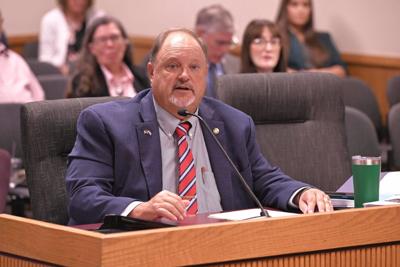A proposal that would make it virtually impossible for voters to change the constitution or state law through the initiative petition process cleared a Missouri House committee Thursday evening.
The legislation sponsored by state Rep. Ed Lewis, a Republican from Moberly, largely mirrors a request from Gov. Mike Kehoe to require a majority of voters in all of Missouri’s eight congressional districts and a statewide majority in order to pass a constitutional amendment or state law on the ballot.
This means a very small percentage of statewide voters in just one district could defeat a ballot measure and it would only apply to citizen-led initiatives, not those placed on the ballot by the legislature. Based on last year’s general election, where 2,960,266 votes were cast for governor and only 311,915 in the 1st District, under the proposed change only 156,000 voters could defeat ballot question — or just shy of 5.3% of the statewide vote.
If approved by lawmakers, the proposed constitutional amendment debated Thursday would go on the statewide ballot and require a simple majority to be enacted.
Missouri is one of 24 states that allows citizen initiative petitions. They can be used to either amend the constitution or change state law, though the path to successfully doing so is often arduous and expensive, requiring tens of thousands of signatures to even land on the ballot.
In the past few years alone, a majority of Missourians voted to legalize abortion and recreational marijuana and to increase minimum wage and mandate paid sick leave through the initiative petition process, all issues opposed by the Republican-dominated legislature.
These ballot measures, Lewis said, compelled him to sponsor legislation raising the threshold for passing initiative petitions. He pointed specifically to a 2022 amendment legalizing recreational marijuana use.
“The voices of those voters in less populated counties were not heard and were overwhelmed by the few heavily populated counties,” he said.
Lewis also criticized a constitutional amendment passed last November that overturned Missouri’s abortion ban.
“This (abortion) amendment didn’t pass in most areas in Missouri, and I believe, would not have passed in even half of the congressional districts,” he said.
Last November, the abortion rights amendment won with just shy of 52% of the vote by drawing support from the state’s urban and more populous areas. Voters in all but eight of Missouri’s 115 counties opposed the amendment.
Lewis said the current process disenfranchises rural Missouri because it doesn’t require “broad geographic support.”
“Every last inch of the state of Missouri needs to be represented when we’re changing the constitution,” he said.
State lawmakers are considering the resolution alongside a proposal to gerrymander the state’s congressional districts.
State Rep. Eric Woods, a Kansas City Democrat, said the two issues could not be “decoupled.”
“If your concern is that certain underpopulated or rural parts of the state don’t have a voice and are using congressional districts as a (corrective) measure,” he said. “If that is important for a ballot measure, how does that argument fly when we’re about to pass a map joining downtown Kansas City to rural Webster County 200 miles away.”
State Rep. David Tyson Smith, a Democrat from Columbia, said the changes to the initiative petition process would remove a pathway for Missourians to remedy redistricting they believe is unfair.
A slew of initiative petitions have been approved for circulation this year ahead of the 2026 General Election. Many focus on preserving the current initiative petition process.
The state’s initiative petition process has been in place since 1908, when it was approved by a majority of voters.
“This whole special session is insidious,” Smith said. “Because it is not just about the initiative process, it’s also about redistricting… The two go hand in hand.”
Lewis said he didn’t believe the two are “linked.”
His legislation also seeks to bar ballot measure campaigns from accepting contributions from citizens of countries deemed “foreign adversaries” of the United States. Kehoe’s request called for banning contributions from “foreign nationals.”
“For far too long, Missouri’s Constitution has been the victim of out-of-state special interests who deceive voters to pass out-of-touch policies,” Kehoe said in a statement last week. “It’s time we give voters a chance to protect our Constitution.”
This year, Kehoe signed into law a restriction on foreign spending on state ballot measures.
Smith said the inclusion of proposals seeking to ban things that are already illegal is simply “ballot candy” seeking to deceive voters.
“We are going to load this up with all this other stuff as a charade to trick people because no one is going to vote for this resolution if they knew exactly what it is going to be,” Smith said.
Lewis rejected that claim, saying contributions from foreign adversaries were not yet illegal when he began sponsoring initiative-petition reform legislation.
Republican members of the committee suggested Lewis amend the proposal to ban all foreign contributions, mirroring Kehoe’s request.
The state of Kansas recently passed a law to ban foreign contributions to initiative petition campaigns. The law was affirmed by a federal judge in July.
Lewis, when asked about foreign spending in Missouri, could not give an in-state example.
The citizen-led campaign to legalize abortion in Missouri, known as Missourians for Constitutional Freedom, raised more than $30 million last year. This included millions of dollars from U.S.-based liberal groups known as dark money organizations because they don’t disclose their donors. A dark money group was also among the main contributors to the anti-abortion movement, which ultimately raised far less money.
Lewis’ proposal would also require a public hearing before an initiative petition is placed on the ballot and that the full text of the ballot measure be on display at polling places.
Another provision would create a criminal election offense for anyone who fraudulently signs or gathers signatures for an initiative petition. This includes those who sign initiative petitions while knowingly not being a registered voter and would charge them with a class-A misdemeanor.
Smith called the provision “ridiculous.” It “doesn’t make any sense,” he said, because corporations could break the law and lack an individual for the charge.
Lewis said he was open to changes to improve the legislation.
“The only way to make this bill better is to burn it,” Smith said, with applause from hearing attendees.
A majority of those who testified spoke in opposition to the proposal, with many calling out a perceived “double standard” between voter-led ballot measures and those placed on the ballot by lawmakers.
“The most offensive part of (the resolution) is the fact that it creates a double standard when you continue to let the legislature place things on the ballot that will be ratified with a simple majority vote,” Ron Calzone, an activist and executive director of Missouri First, told the committee. “That is a shift of power to the government. That’s not a Republican thing either. That’s not a conservative thing either.”
Opponents who testified Thursday included people who have gathered signatures for recent ballot-measure campaigns and groups involved in recent initiative petitions.
Truman Oaks, a 19-year-old Columbia resident who gathered signatures for a ballot measure last year, said the proposal would set an unfair standard for citizen-led petitions.
“If this joint resolution passes, it is the end of the petition process, though not formally,” he said. “I speak for myself and so many other people I know that have been involved in this work in saying that maybe there is a one in 100 chance we win all eight districts.”
Susan Klein, executive director of anti-abortion group Missouri Right to Life, said the proposal would safeguard the State Constitution from “one or two districts that are making the rest of us live by constitution (changes).”
State Rep. Keri Ingle, a Lee’s Summit Democrat, asked whether Klein would support the stricter standards for an upcoming anti-abortion ballot measure proposed by lawmakers.
“Would you bet that Missouri is so pro-life that it could pass by a majority in every congressional district next year, if you were to put it on the ballot by that standard?” she asked.
“That is not what we are here to testify on today,” Klein said.
The committee rejected an amendment offered by Ingle that would apply the stricter standards to resolutions placed on the ballot by state lawmakers in a party-line vote.








